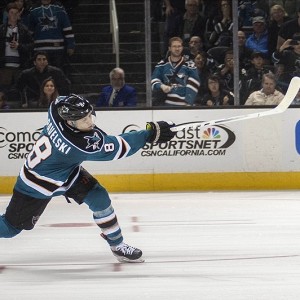Three things happened with the San Jose Sharks on Saturday night when they played the Minnesota Wild. The score of the game ended 2-0 in favor of the Wild. That should have been the least important development. Two changes coach Peter DeBoer made, however, looked to be more significant.
The two changes appeared more significant because they represented a change in course, something many Sharks fans have hoped for all this year. DeBoer had pretty much followed the same well-worn path of his predecessor, Todd McLellan. DeBoer said he wanted to roll four lines, but there he was, doing exactly what McLellan had done the prior year: rolling three lines and using a limited-talent fourth line very sparingly. DeBoer was putting the same key players together for almost the same amount of ice time as McLellan. Even the player in the doghouse, Matt Tennyson, remained the same.
Breaking the Ice

On Saturday night, it appeared that DeBoer was going to make a break from Sharks history. DeBoer’s first change was breaking up the Joes: Joe Pavelski and Joe Thornton. That change matters — it was a break from the past couple seasons. While Pavelski and Thornton have been major contributors when paired together, each is fully capable of making other players better. History suggests the Sharks are a better team with their two best forwards each commanding their own line.
The second change mattered most of all, as it represented a major change. Thornton recently passed his tenth anniversary with the Sharks. He has played in 878 games for the Sharks, including 97 playoff games. In every game, at least as best I can recall, it was easy to determine the Sharks top line. It was the Thornton line. Every game. The Thornton line and the top line were redundant terms. Now at age 36 and on pace for career lows in several areas, Thornton was off the top line for the start of the game. The Sharks had entered a brave new world — one Sharks fans could embrace.
Thornton remains a very good hockey player. A recent scoring drought is not defining his overall play. On the top line with Pavelski, the Sharks were scoring a few less goals than in the past, but they’d have made Ebenezer Scrooge proud with how little they were giving up to opponents.

At 36, Thornton is plenty skilled, but getting the most out of him means employing him a different way than what might have made sense five years ago (this applies to Patrick Marleau as well, as noted in this linked article). Getting the maximum value from Thornton matters to this team. His maximum value comes from making other players better with a key caveat: do not use Thornton past his point of diminishing returns.
With the ice broken by these changes, DeBoer could open up and explore the vast array of choices he has – choices he has always had, but not taken.
The Sharks have been struggling, so the willingness of the coach to break with longstanding tradition should have been a bright spot. Alas, whatever hopes one might have had with the changes were short-lived. By the third period, DeBoer was completely over his own experiment. Even though the game was a scoreless tie, Pavelski was reunited with Thornton on the top line. With all the choices DeBoer could have made, it is telling that he quickly returned to ‘the way we were’.
Changes and Inexperience

If there was another newsworthy note on this particular night, it was the inexperience in the Sharks line-up. The team put out six players with under 82 NHL games experience, including one player making his NHL debut and another in his fourth NHL game. A scoreless tie into that stretched into the third period was a respectable result. It made sense to spread the experienced talent throughout the line-up. Nonetheless, the game-winning goal came with two of the inexperienced skaters on the ice. A miscommunication left the Wild’s Zach Parise all alone in front of the net with time to shoot, collect his own rebound and shoot again (an empty netter accounted for the final tally.)
The result of the game on Saturday could be far less important than the changes made by the coach to begin the game. DeBoer has waited for 1/3 of the season to adjust his approach. What is disturbing is how quickly DeBoer abandoned his own experiment. The game was a scoreless tie, not a situation worthy of a panic move. The team was riding a five game losing streak. Slightly less than two full periods into the game, DeBoer returned to his ‘safe place’, even though that safe place has led to five consecutive losses. He again loaded up the talent on the top line, and an inexperienced lower line was on the ice for Minnesota’s game-deciding goal. It is now six consecutive losses.
The changes DeBoer made resulted in two periods of scoreless hockey by both teams. The changes didn’t fail. The only grade that could be given to the changes at that point: incomplete. And yet, before allowing the changes to play out for even just one full game, DeBoer gave up on them. By quickly reverting to prior struggling approaches, the Sharks actually failed at attempting to make a change.
A coach has to set his own direction and be willing to part with history, even if it means leaving one’s comfort zone. In that regard, Saturday night was a success. Right up until it became a failure.